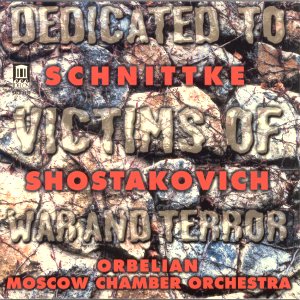 |
Dmitri SHOSTAKOVICH Chamber Symphony op 110a (1960) Alfred SCHNITTKE Concerto for Piano and Strings (1979) Constantine Orbelian (pianist and conductor) Recorded at Skywalker Sound, Marin County, California, 5 & 7 March 2000 Crotchet £17.99 AmazonUK £20.99 AmazonUS Amazon recommendations |
Shostakovich's Eighth String Quartet is one of the most intensely personal compositions ever written. In 1960, the composer was in a very depressed state: Soviet officials had decreed that he must become a member of the Communist party (his membership was to be announced publicly at a meeting of the Union of Soviet Com-posers). He wrote the quartet in three days and made no secret of its autobiographical character. As Constantine Orbelian puts it in an appreciative sleeve-note: ' . . . the Eighth Quartet is first and foremost a tragic meditation, a story of the tortured soul of the composer himself . . .' What we have here is Rudolf Barshai's masterly transcription of the original for full string orchestra (of which, incidentally, Shostakovich thoroughly approved). A one-movement work, with five distinct sections, it is full of quotations from his earlier works (notably the first, fifth and tenth symphonies) but the brooding DSCH motif dominates the whole piece from first bar to last. The generally tragic mood is punctuated by typical outbursts of savagery. Orbelian draws a wonderfully passionate and sensitive response from his players in a performance of great stature.
Schnittke, too, suffered at the hands of the Soviet regime and his Concerto for Piano and Strings makes an apt coupling with the Shostakovich. Though not overtly 'autobiographical', the work is clearly in the nature of a spiritual journey, not least in its unusual structure - a variation-form in which the full theme does not appear until the closing bars. Schnittke's distinctive language - ranging from the contemplative to the manic - casts its customary mesmerising spell, as does his use of quotations from the works of other composers - in particular, the three-note motif (C, D, E) which forms the peroration to the opening section of Strauss's Also Sprach Zarathustra is subjected to a series of most extraordinary mutilations.
Much as I would like to hail this disc as an absolute winner, I am unable to do so. At 47:37 it constitutes exceptionally mean playing-time, but that is not my main concern. There comes with the disc a welter of technological hype ('With this recording, Delos takes an early step into the realm of a new technology: Direct Stream Digital audio . . .') This means nothing to a technological illiterate such as myself - I can rely merely on what I hear. In the Schnittke, the piano is not only much too far forward (it seems that the microphone(s) were actually placed inside the instrument), but the tutti strings in fortissimo (and in competition with the piano) deliver a bloated, nondescript sound of a sort which could have been produced by the most primitive of synthesisers. Most disappointing. Otherwise, a splendid disc.
Adrian Smith